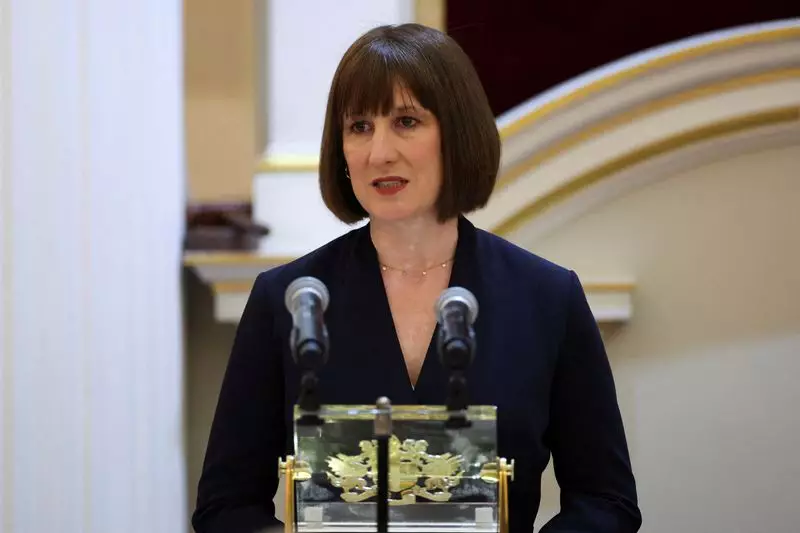The economic landscape of Britain currently resembles a turbulent sea, with waves of market volatility and uncertainty sweeping over its financial foundations. As the finance minister, Rachel Reeves, and Prime Minister Keir Starmer grapple with rising government borrowing costs and a declining pound, the immediate outlook appears grim. Factors beyond their direct control, including fluctuations in the U.S. economy and the influence of Donald Trump, could determine whether this month’s market turbulence marks a temporary setback or signals the inception of a more profound crisis for the Labour government that assumed power just last July.
The backdrop of rising gilt yields, notably the notable spike in 30-year gilt rates, underscores the gravity of the situation. As they reached levels not seen since the late 1990s, the pound also slumped to its lowest value since November 2023. Starmer’s declarations of a “ruthless” approach to budget repair resonate with a sense of urgency, yet the path forward remains fraught with complexities. While the Labour government attributes the current economic disarray to the actions of previous Conservative administrations, including the chaotic aftermath of Brexit and the tumult of Liz Truss’s mini-budget, Reeves’s options for navigating these challenges are limited.
Reeves’s commitment to maintaining her fiscal targets stands firm, even as the economic landscape shifts unfavorably. During her recent visit to China, she emphasized that her fiscal rules are non-negotiable; however, the intricate web of public finance management reveals limited avenues for immediate corrective action. With the possibility of further spending cuts looming if the budget is deemed off-course, she faces the risk of alienating crucial segments of her party’s base. Despite calls for austerity, imposing additional tax hikes seems out of the question, especially in the wake of increased social security contributions that have already led firms to scale back hiring.
The precariousness of this situation is compounded by the government’s impending two-year Spending Review scheduled for June. Experts in economic research observe that any measures currently being implemented to spur growth are unlikely to produce substantial results until well into the next decade. The notion of balance in this fiscal juggling act requires Reeves to consider short-term outcomes alongside long-term economic recovery, a task that proves to be a formidable challenge.
As the international economic landscape continues to evolve, attention is drawn to the role of U.S. President-elect Donald Trump and his proposed policies. His promise of imposing additional tariffs on imports could exacerbate U.S. inflation, subsequently impacting global markets—including Britain’s. Many analysts point to a lack of confidence that we will see a significant decline in British gilt yields, particularly in light of the anticipated volatility in U.S. Treasury yields. As insights from Deutsche Bank’s chief UK economist Sanjay Raja suggest, the dependency on foreign investors to bolster the UK’s current account deficit may also leave the economy vulnerable to external shifts.
Historically, domestic entities such as pension and insurance funds played a central role in purchasing government debt, holding a steady 75% of new debt in the past. Currently, their participation has plummeted to a mere 20%, reflecting a shift in market dynamics driven by the rise of hedge funds. This transformation raises concerns over the market’s increasing susceptibility to fluctuations, adding another layer of uncertainty for Reeves and her team to navigate.
The Bank of England’s decisions surrounding interest rates are yet another critical variable that lies outside Reeves’s direct control. Investor expectations indicate a modest likelihood of interest rate cuts in 2025; however, the looming inflation rates, coupled with labor costs and inflationary expectations, complicate the analysis. A surprisingly robust U.S. payroll report recently triggered immediate repercussions, demonstrating how interconnected economies can vastly impact currency values and financial confidence.
In the midst of these multifaceted challenges, experts caution against implementing hasty policies that may signal panic within the government. Reeves must navigate this landscape delicately while also considering the effects on market sentiment. While some analysts surmise that significant interventions are unnecessary, the underlying difficulties remain pronounced.
Amidst the myriad challenges standing in the way of a stable financial future, one overarching theme prevails: the necessity for economic growth. As Hetal Mehta from St. James’s Place aptly notes, growth is the fundamental concern that looms large both in the immediate and distant horizon. The path to recovery and stabilization hinges on strategic decisions that can bolster confidence in the UK economy, reassuring stakeholders and citizens alike.
As Rachel Reeves and Keir Starmer confront the daunting landscape of Britain’s economy, the stakes have never been higher. While external forces may determine much of what unfolds in the coming months, the government’s response to the challenges at hand will shape the trajectory of the UK’s financial health. Balancing fiscal responsibility while laying a groundwork for sustainable growth will be essential in weathering this economic storm.

